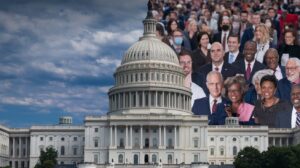Senate Minority Leader Chuck Schumer surprised Capitol Hill Saturday by insisting that clerks read aloud the entire 940–1,000‑page GOP “megabill” before debate—stalling the fast-track vote by approximately half a day. The move, designed to ensure transparency and give senators more time to review the complex tax-and-spending package, signals deep Democratic resolve to highlight the high stakes and vast scope of the legislation.
What’s Inside the GOP Megabill
This structural reconciliation bill, informally dubbed “One Big Beautiful Bill,” merges sweeping tax cuts, border enforcement measures, and substantial defense spending. It would perpetuate 2017 tax cuts, eliminate taxes on tips and overtime, and dedicate nearly $3.8–4 trillion to tax relief, offset partially by deep cuts to Medicaid, SNAP, and clean energy initiatives.
Proponents say this comprehensive approach offers economic growth and fiscal uplift. They argue that the bill’s tax breaks will spur job creation and wage growth. Democratic critics and bipartisan analysts counter that cost-cap tactics obscure a multi-trillion‑dollar expansion of the national debt and severely threaten safety-net programs .
Schumer’s Delay Tactic & Political Message
Schumer’s maneuver—to read the entire text aloud—is a procedural move with political resonance. He asserted: “Republicans won’t tell America what’s in the bill. So Democrats are forcing it to be read start to finish”. The reading, expected to take 12–15 hours, reflects a deliberate effort to spotlight the opaque legislative rush and allow for deeper scrutiny .
In the Senate’s current slow-motion “vote-a-rama” process, unlimited amendments follow. With Schumer’s tactic, Democrats seek to maximize scrutiny and public pressure before crucial floor votes begin.
Senate GOP’s Timeline and Internal Tensions
Republican leaders are determined to pass the measure before July 4, using budget reconciliation to bypass a 60‑vote filibuster. With a razor-thin 53–47 majority, they can only afford three defections. Lawmakers such as Rand Paul, Ron Johnson, and Thom Tillis have raised Medicaid and spending concerns.
The Senate parliamentarian has already voided certain provisions—including judicial injunction limits and silencer deregulation—as non-compliant with budge reconciliation rules. Republicans are also hastily revising Medicaid cuts and SALT caps to sustain party cohesion.
Fiscal and Policy Fallout
Critics point to the Congressional Budget Office’s projection of $3 trillion added to the national debt over a decade, ignoring optimistic accounting by the White House’s Council of Economic Advisers nypost.com. Another watchdog, the Committee for Responsible Federal Budget, estimates a $4.2 trillion deficit hit using traditional budget baselines washingtonpost.com.
Medicaid cuts, according to CBO, risk depriving 10.9 million Americans of healthcare and stripping assistance from 3 million food aid recipients. Meanwhile, luxury tax breaks benefit wealthier taxpayers while undermining support for low-income families, renewable energy, and rural hospitals.
Strategic Implications for Public Trust
Historically, forcing a full reading during budget reconciliation recalls Democratic tactics in 2021, when Republicans compelled real-time review of the American Rescue Plan. Schumer’s tactic echoes that precedent: shining a light on legislative details while positioning Democrats as defenders of transparency.
This delay strategy may influence public perception, rallying constituents concerned about rushed policymaking. However, it could also alienate moderate senators frustrated by procedural standoffs—and further polarize the partisan divide.
Conclusion
By compelling the Senate to read a 1,000‑page bill line by line, Schumer has temporarily halted GOP momentum, forcing spotlight and scrutiny onto one of the most consequential legislative packages in recent memory. This move underscores not only the high-emotion tax-versus-spending battle but also deeper questions about process, transparency, and democratic accountability. As the July 4 deadline looms, the success or failure of this delay will reverberate well beyond Capitol Hill.
Subscribe to trusted news sites like USnewsSphere.com for continuous updates.





